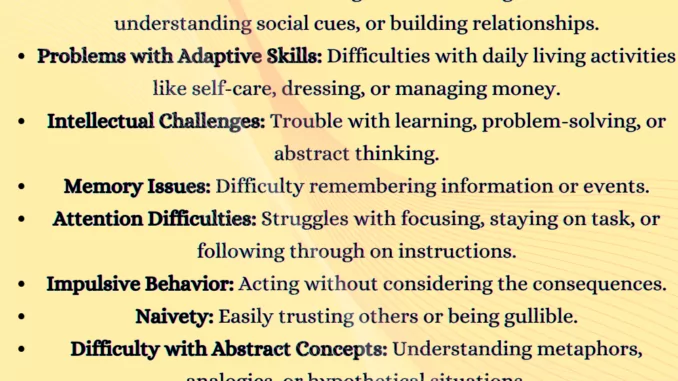
Understanding Clear Signs of Intellectual Disability: Recognizing Developmental Challenges
Intellectual disability is a condition that affects a person’s mental abilities, impacting their intelligence, learning, and everyday life skills.
Here are some key points:
- Definition: Intellectual disability involves limitations in mental abilities that affect various areas of functioning. It’s not solely about IQ; other skills necessary for daily life matter too.
- Symptoms: These difficulties can manifest in academic skills, social skills, and domestic skills. Some people experience minor effects and lead independent lives, while others require lifelong assistance.
- Causes: Although the exact cause is often unknown, differences in brain development are common. Brain damage from illness, injury, or other events can also lead to intellectual disability.
- Prevalence: Worldwide, it affects 1% to 3% of children and is slightly more common in males than females.
Potential Signs of Intellectual Disability
- Delayed Development: Significant delays in reaching milestones like sitting, crawling, walking, or talking.
- Difficulty Learning: Challenges in understanding and following instructions, learning new skills, or solving problems.
- Limited Communication: Problems expressing thoughts and feelings, using language appropriately, or understanding nonverbal cues.
- Impaired Social Skills: Difficulty interacting with peers, understanding social cues, or building relationships.
- Adaptive Behavior Challenges: Struggles with daily living activities like self-care, money management, or following routines.
- Memory Problems: Difficulty remembering information, events, or people.
- Attention Difficulties: Trouble focusing, staying on task, or following through on instructions.
- Impulsive Behavior: Acting without considering consequences, making rash decisions.
- Limited Curiosity: Lack of interest in exploring the environment or learning new things.
- Difficulty with Abstract Concepts: Understanding complex ideas or hypothetical situations can be challenging.
- Overreliance on Others: Requiring constant support or assistance with daily tasks.
- Low Self-Esteem: Feeling inadequate or inferior compared to peers.
- Behavioral Issues: Exhibiting behaviors like aggression, tantrums, or self-injurious behavior.
- Physical Characteristics: In some cases, associated physical features may be present, but this is not always the case.
Main Signs of Intellectual Disability
Intellectual disability is a developmental disorder characterized by limitations in both intellectual functioning and adaptive behavior. While the severity can vary widely, common signs include:
1. Developmental Delays
- Delayed milestones: Significant delays in reaching typical milestones like sitting, crawling, walking, or talking.
- Speech and language development issues: Difficulty in communicating, understanding language, or forming clear sentences.
- Motor skills challenges: Problems with coordination, balance, or fine motor skills.
2. Cognitive Impairments
- Difficulty in learning new skills: Struggles with academic subjects or acquiring new knowledge.
- Problems with memory and attention: Challenges in remembering information or staying focused.
- Challenges in problem-solving and reasoning: Difficulty understanding complex situations or making decisions.
3. Adaptive Behavior Difficulties
- Issues with daily living skills: Challenges with self-care, household chores, or managing money.
- Social and communication challenges: Difficulty building and maintaining relationships, understanding social cues.
- Problems with self-care and independence: Requiring assistance with personal hygiene or daily routines.
Diagnosis and Assessment
- Criteria for diagnosing intellectual disability: A comprehensive evaluation typically involves:
- Significantly subaverage intellectual functioning (IQ below 70)
- Limitations in adaptive behavior affecting daily life
- Onset before age 18
- Tools and methods for assessment: IQ tests, standardized behavior rating scales, and clinical interviews are used to evaluate cognitive abilities and adaptive skills.
- Role of healthcare professionals: Pediatricians, psychologists, and developmental specialists play key roles in diagnosis and developing appropriate support plans.
Support and Intervention
- Educational support and special education: Tailored education programs to address specific learning needs, including individualized education plans (IEPs).
- Therapies and treatment options: Speech therapy, occupational therapy, physical therapy, and behavioral therapy can help improve communication, motor skills, and daily living skills.
- Family and community support systems: Providing emotional support, resources, and advocacy for individuals with intellectual disabilities and their families.
It’s important to note that early identification and intervention are crucial for optimizing outcomes for individuals with intellectual disabilities.


